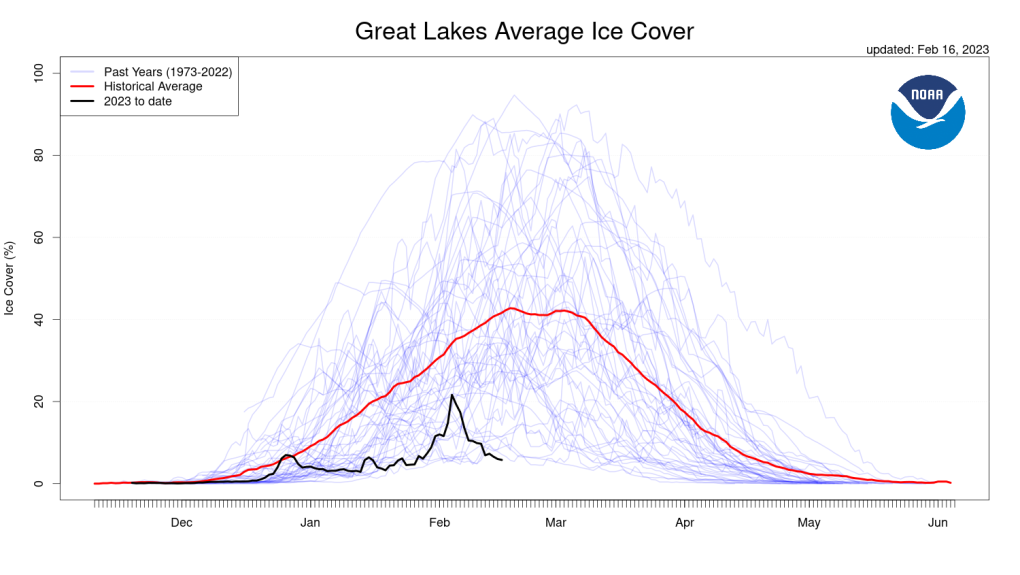Great Lakes ice cover at 50-year low
A look along most Ontario shorelines shows the minuscule amount of ice that’s on the Great Lakes this winter.
“But it’s not unprecedented. We’ve had three years in the past decade where we’ve had next to no ice, at least in the lower lakes,” says Dr. Mike McKay, Executive Director of the University of Windsor’s, Great Lakes Institute for Environmental Research.
On this date last year, 40% of the Great Lakes were covered in ice, but today, ice cover is less than 6%, marking the lowest ice cover on this date, since the National Oceanic Atmospheric Administration starting tracking Great Lakes ice cover, in 1973. Great Lakes ice cover (Source: NOAA-National Oceanic and Atmospheric Administration)
Great Lakes ice cover (Source: NOAA-National Oceanic and Atmospheric Administration)
“Climate change. It’s consistent with climate change. It parallels what we’re seeing in the Arctic with ice loss from the Poles. We’ve seen a 75% decline in ice cover in the Great Lakes over the past 50 years,” says McKay.
Less ice means unimpeded shipping seasons, and less need for ice breakers, but it has plenty of potential negative consequences, too.
“Increased coastal erosion. More potential for lake affect snow, and there’s all sorts of ecological considerations,” says the University of Windsor professor.
The mild winters that lead to an uncovered lake means water temperatures are 1.5 to 2 degrees warmer than normal for this time of year, which can mean an earlier start to beach season, but warm waters are not they’re cracked up to be, says McKay.
“That can set the stage for longer period where blue-green algae will bloom in places like Western Lake Erie. So, there’s lots of concern right now, with warmer lakes,” he says.
McKay says there will continue to be some years with more ice on the Great Lakes, but the trend in the past two decades, is for more years like this, where it’s not February frozen, it’s February flowing, on our Great Lakes.
You can see current and past Great Lakes ice conditions by visiting https://www.glerl.noaa.gov/data/ice/#currentConditions.
CTVNews.ca Top Stories

Canadian musician Jacob Hoggard found not guilty of sexual assault
Canadian musician Jacob Hoggard has been found not guilty of sexually assaulting a young woman in northeastern Ontario eight years ago. The former Hedley frontman had pleaded not guilty to sexual assault.
Police arrest Toronto woman in connection with three recent homicides
Police have arrested a Toronto woman in connection with three recent homicides and investigators say that they believe two of the victims may have been 'randomly targeted.'
Missing B.C. climber died from fall on Mount Baker, medical examiner says
The body of a British Columbia mountain climber has been located and recovered after the 39-year-old man was reported missing during a solo climb on Washington state's Mount Baker earlier this week.
Following child's death in Ontario, here's what you need to know about rabies and bats
An Ontario child died last month after coming into contact with a rabid bat in their bedroom, which was the first known human rabies case in Canada since 2019.
A French judge in a shocking rape case allows the public to see some of the video evidence
A French judge in the trial of dozens of men accused of raping an unconscious woman whose now former husband had repeatedly drugged her so that he and others could assault her decided on Friday to allow the public to see some of the video recordings of the alleged rapes.
Former Colorado county clerk Tina Peters sentenced to 9 years for voting data scheme
A judge ripped into a Colorado county clerk for her crimes and lies before sentencing her Thursday to nine years behind bars for a data-breach scheme spawned from the rampant false claims about voting machine fraud in the 2020 presidential race.
Anne Hathaway confirms 'Princess Diaries 3': 'Miracles happen'
You might be thinking, 'Shut up!' but it’s officially true: the 'Princess Diaries' franchise is finally growing.
Youth pleads guilty to manslaughter in death of P.E.I. teen Tyson MacDonald
A teen charged with the murder of another teen on Prince Edward Island last year has pleaded guilty to a lesser charge of manslaughter.
Sask. man pleads guilty in U.S. after unknowingly providing videos of men raping toddlers to FBI agent
A Saskatchewan man living in the United States has pleaded guilty to possessing child pornography after he unknowingly provided disturbing videos to an FBI agent he thought was a pedophile.

































